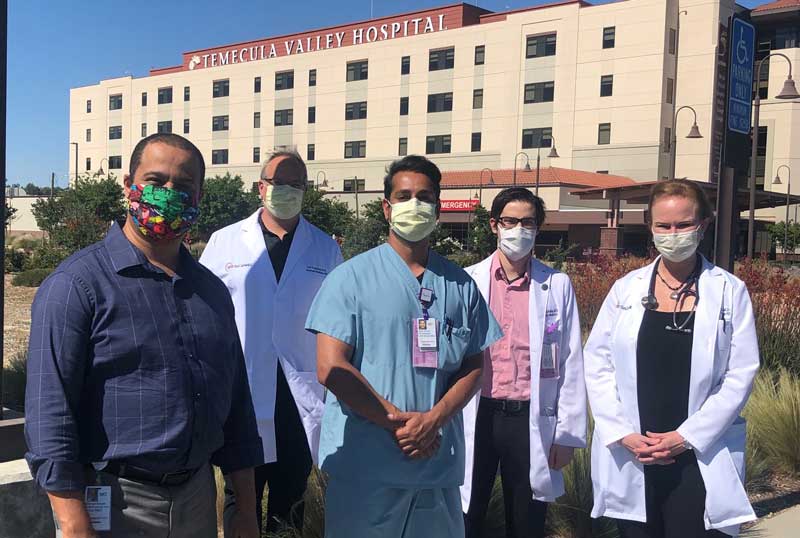Hands-on Disaster Training Provides Experience in Managing Emergencies
June 12, 2020
In the midst of the COVID-19 pandemic, Temecula Valley Hospital’s inaugural group of Graduate Medical Residents is providing care to coronavirus victims and learning vital skills for responding to future health emergencies.
As the crisis began, program leaders created an elective in disaster response to allow residents to be on the front lines of pandemic response. “We modeled after another program’s plan to involve residents in responding to the 2018 Camp Fire in Northern California,” says Joel Trambley, MD, Internal Medicine Program Director. “Our goal is to have residents learn how to treat COVID-19 patients safely and effectively, but also to learn how to respond to other disasters that could happen in the future.”

From L to R: Michael Nduati, MD; Joel Trambley, MD; Sean Anand, MD; Derek Schultz, MD; and Carrie Bacon, MD.
Managing Community Healthcare Emergencies
“The COVID-19 pandemic is an unfortunate and devastating event in which most clinicians have had no formalized education or experience in managing,” says Derek Schultz, MD, the first Internal Medicine resident on the elective. “The disaster elective at Temecula Valley Hospital has allowed the future generation of physicians to get hands-on experience and training in managing these types of community healthcare emergencies.”
Residents in the Family Medicine Program work in the Emergency Department in their first year and can participate in the disaster elective. “Like all healthcare workers, our residents have concerns about their health and their families. We are proud that they continue to work to treat patients in Riverside County,” says Carrie Bacon, MD, Program Director for Family Medicine. “Community health is at the heart of every Family Medicine Program.”
The Family Medicine program has six residents per year, while Internal Medicine has 20. Both programs successfully filled all their positions for the academic year 2020-21 through the National Residency Matching Program and, by their third year, plan to have 18 and 60 residents respectively. The residency programs are sponsored by the UHS Southern California Medical Education Consortium (UHS SoCal MEC), which includes Temecula Valley Hospital, Inland Valley Medical Center, Rancho Springs Medical Center, Corona Regional Medical Center, and Palmdale Regional Medical Center.
“Part of our mission is to help address the shortage of healthcare providers in Riverside County. We are proud of our first 26 residents and excited about next year’s class. We continue to look at adding more trainees and programs,” says Michael Nduati, MD, who oversees the training programs as the Designated Institutional Official/Chief Academic Officer.
